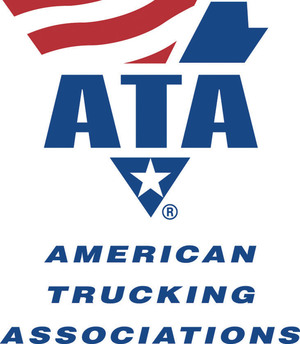
ARLINGTON, Va., Dec. 8, 2011 /PRNewswire-USNewswire/ -- American Trucking Associations President and CEO Bill Graves urges policymakers to avoid jumping to conclusions based on highway fatality figures released today by the Department of Transportation.
(Logo: http://photos.prnewswire.com/prnh/20100129/ATALOGO)
"Every fatality on our highways is a tragedy, and the uptick in the 2010 preliminary report concerns us deeply. Without more information and analysis, though, it is difficult to draw conclusions about what this preliminary data means," Graves said. "We would hope that policymakers will avoid the 'error of recency,' by overemphasizing the newest data at the expense of the overall, long-term trend, which has been overwhelmingly positive. We look forward to seeing further analysis from DOT on crash types as well as how many miles American motorists and truck drivers traveled last year.
"Even with this increase, 2010 was the among the safest years on record for the trucking industry thanks in large part to the good faith efforts of America's truck drivers, vehicle manufacturers, truck fleet safety directors, law enforcement officers and true safety advocates, rather than due to economic hardship or other ancillary factors," Graves said. "By remaining vigilant and focused on the true causes of crashes, I'm confident that we will be able to continue the marked declines in the number of truck-involved crashes and fatalities on our highways that we have seen in over the past decade."
The full and complete data from DOT for the last decade shows improvement in overall highway safety, and clearly shows trucking's marked safety improvement.
Over the past 10 years (1999 to 2009) the number of large trucks involved in:
- Fatal crashes dropped by 35%;
- Injury crashes dropped by 48%.
Over the past 10 years (1999 to 2009), the number of registered large trucks grew by more than 3 million, or 41%.
Over the past 10 years (1999 to 2009), the number of passenger vehicles involved in:
- Fatal crashes dropped by 24%, 11 percentage points lower than the change in the truck numbers;
- Injury crashes dropped by 29%, 19 percentage points lower than the change in the truck numbers.
Over the past 10 years (1999 to 2009), the number of registered passenger vehicles grew by more than 17%, 24 percentage points lower than the truck growth.
Over the most recent years of economic growth (2002 to 2007 – using the base recession year of 2001):
- The truck-involved fatality rate dropped by 35%;
- The truck-involved injury rate dropped by 47%;
- The passenger vehicle fatality rate dropped by 11%, 24 percentage points lower than the change in the truck rate;
- The passenger vehicle injury rate dropped by 23%, 24 percentage points lower than the change in the truck rate.
Over the economic growth years of the 1990s (1992 to 2000 – using the base recession year of 1991):
- The truck involved fatality rate dropped by 20%;
- The truck-involved injury rate dropped by 8%;
- The passenger vehicle fatality rate dropped by 19%, 1 percentage point lower than the change in the truck rate;
- The passenger vehicle injury rate dropped by 18%, 10 percentage points higher than the change in the truck rate.
During the recession (2008 and 2009 – using the base year of 2007):
- The truck-involved fatality rate dropped 26%;
- The passenger vehicle fatality dropped 16%, 10 percentage points lower than the change in the truck rate.
ATA looks forward to working cooperatively with DOT leadership to keep the highway and truck safety trends moving in the right direction.
American Trucking Associations is the largest national trade association for the trucking industry. Through a federation of 50 affiliated state trucking associations and industry-related conferences and councils, ATA is the voice of the industry America depends on most to move our nation's freight. Follow ATA on Twitter or on Facebook. Good stuff. Trucks Bring It!
SOURCE American Trucking Associations






Share this article